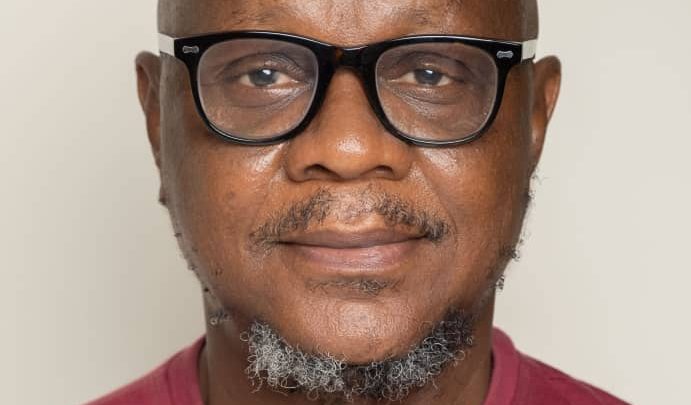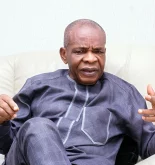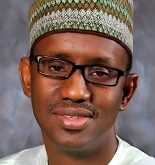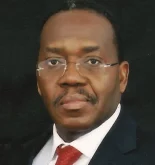Your Excellency, My Dear Governor,
The Nation is not Smiling
Beyond the personal and political ramifications, there is a deeper concern: the country itself. Nigeria is bleeding, and most of the agony is the result of the policies and programmes of the federal government. Millions of people have found life miserable. Fuel costs have severely impacted transportation and trade. Food has become a luxury item in majority of homes based on data from the Nigerian Bureau of Statistics and the World Bank. Nigerians are paying so much in tax and receiving very little or no value for it. Insecurity continues to endanger the core of the nation. Young people are disillusioned. Data and telecommunications costs have risen significantly. The average citizen is finding it increasingly difficult to access education, business, and basic communication services. And, despite these, corruption has not simply continued. It is thriving. It is deeper, bolder, and more brazen than ever. The judiciary, once a hallowed institution, is now accused of compromise and has issued judgments that raise more problems than they resolve. The National Assembly appears passive and subservient, rather than defending the people. Many argue that it is a rubber stamp in the hands of the executive.
To give you a little context, on April 28, the World Bank projected a 3.6 percentage point increase in poverty across Nigeria over the next five years, extending through 2027. This sobering forecast was contained in the latest edition of the Africa Pulse report, unveiled during the Spring Meetings of the International Monetary Fund (IMF) and the World Bank in Washington, D.C., United States. The sad fact is that the 3.6 percent of Nigerians who are falling into extreme poverty include Akwa Ibom people.
In a related development, the President of the African Development Bank (AfDB), Dr. Akinwumi Adesina, raised strong concerns about the country’s economic path, describing Nigeria’s growth as “anaemic.” He underscored the gravity of the situation by noting that the nation’s Gross Domestic Product (GDP) per capita had fallen sharply—from $1,847 at the time of independence to a mere $824 in 2024. This dramatic decline, he warned, poses a serious threat to Nigeria’s long-term economic stability and development. The policies and programmes that have brought the country to such a sorry pass are made by the federal government and the ruling party you are moving to.
With due respect, Your Excellency, are these pressing realities the driving force behind your decision to align with the centre? Is this move borne out of genuine conviction, or is it merely a matter of convenience? Do you truly believe that joining the ruling party is the right course of action, not just for your personal interest, but for a nation teetering on the edge of authoritarianism and drifting toward a one-party state? If you sincerely believe that this decision will bring meaningful development to our state, then we ask you to present the evidence. Show us the substance behind the choice.
Consider the case of Benue, where violent herders continue to wipe out entire communities with alarming frequency. Look also at Katsina, Sokoto, Gombe, Yobe, Ondo, Ogun, Kogi, and Nasarawa; states governed by the ruling party, where insecurity, deepening poverty, and collapsing infrastructure remain largely unaddressed.
By contrast, states like Akwa Ibom, Abia, Anambra, and Rivers – before its governance was rudely disrupted by an emergency declaration, had consistently outperformed many states controlled by the ruling party. This is clearly reflected in verifiable development indices that measure infrastructure, education, healthcare, and overall quality of life.
The argument that identifying with the ruling party guarantees federal attention is not only misleading but constitutionally flawed. The 1999 Constitution (as amended) does not grant any state preferential treatment based on political affiliation or presidential loyalty. Suggesting that a state must align with the president’s party to receive its fair share of national resources is both faulty and dangerous. It undermines the core principles of federalism, equity, and justice. It also threatens to turn our democracy into a partisan bargaining chip. As it stands, none of the state controlled by the ruling party is enjoying such preferential treatment. What makes you believe Akwa Ibom will?
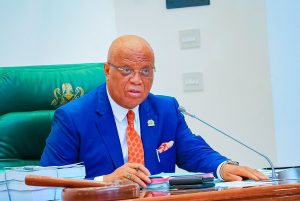
Akwa Ibom State Governor, Umo Eno
Of Parallels and Framing
Your Excellency, while parallels can be useful in simplifying complex issues, they can also distort reality when context is removed. No matter the explanation offered, comparing your potential defection to boarding Air Peace because Ibom Air is faulty is a typical example of a negative frame, which reduces a significant political act to a personal consumer choice. Framing Theory in communication states that how an issue is framed influences public perception. Your comparison portrays political defection as a neutral or even necessary act, similar to a traveler peacefully transferring airlines to guarantee the safety of their trip. However, governance is not a business transaction. Political leadership requires moral authority, public trust, and implications for the future. It is not only about achieving a personal or political goal, but also about inspiring others with vision and honesty. In a developed country where the business community is highly sensitive to the behavior, statements, and even body language of corporate leaders—particularly in the aviation sector—public trust and share value in Ibom Air would have plummeted if its owner openly said the airline is faulty and declared he was flying with a competitor. Such a declaration would be interpreted as a scathing vote of no confidence, sparking an image crisis and maybe regulatory investigation.
Ibom Air is not “faulty.” It exemplifies what good governance in Akwa Ibom can achieve: creativity, efficiency, and pride in public service. It is state-owned, publicly supported, and thriving despite the economic crisis triggered by federal government. Using it as an excuse to defect to a political party associated with high inflation, poverty, popular discontent, and rising insecurity, risks presenting achievement as failure and undermining your own legacy and the legacy of our past leaders who conceived, built and sustained the Ibom Air brand. Furthermore, unlike airplanes, political parties do not provide neutral services. They are vehicles for ideology, governance style, and policy direction. Defecting from one party to another, particularly from one opposed to the ruling party at the centre, is not the same as changing tickets between competing airlines. It sends a message to your followers and history about what you stand for, particularly during a moment of national distress.
Rather than adopting the logic of self-preservation (including your predecessor) or convenience, the more powerful and responsible frame is one of principled leadership: remaining committed to the values that brought progress to the state, resisting pressure to join forces with a party whose actions are exacerbating the sufferings of Nigerians, and standing firm with the people — even when it is easier to defect. Leaders who held the line are remembered in history, not those who boarded another “flight” when things became politically unpleasant.
AN OPEN LETTER TO GOVERNOR UMO ENO – Part 1
You Don’t Need to Cross the Fence to Get a Second Chance
Your Excellency, if no one has told you, let me say it here. You have demonstrated outstanding stewardship. Your decision to commit over ₦60 billion to clearing the backlog of gratuities, leave grants, promotion arrears, and other worker welfare schemes has touched many lives and restored confidence among civil servants and retirees. Akwa Ibom people were told countless times that the state was not owing gratuities, pension and promotion arrears. The very people who peddled those false narratives are now applauding you for admitting what they once vehemently denied—that workers and senior citizens were actually owed.
Instead of borrowing, you have paid off a significant portion of the debts owed by your predecessors. Your bipartisan approach to governance, empathy for the poor and needy, simplicity, sense of peace and fairness, and apparent commitment to spreading development projects throughout the state have won you the hearts of people. You have distinguished yourself as a true servant-leader, and Akwa Ibom people now hold you in high regard. If you are in any doubt, disguise yourself and go to Udua Akpan Andem or Udua Itam and ask the traders and buyers what they feel about Governor Umo Eno and the leader in Aso Rock.
Your Excellency, I urge you to listen to those who present strong, well-reasoned arguments, even when they disagree with you. These are often the people who care most about your success.
You have already made significant achievements and earned genuine goodwill among the people. You do not need to switch political allegiance to secure a second term. There is nothing wrong with seeking bipartisan support; in fact, it is commendable. But abandoning the party that gave you a platform, especially when the state is not facing a crisis would be a misstep.
While there may be political crisis at the national level, your party in Akwa Ibom remains strong and united. Under your leadership, the state has seen unprecedented peace and brotherhood across party lines. We do not need to return to a time when politically motivated killings, resentment, and fighting were common. Allow all political parties in the state to operate freely. Allow them to attract members based on the quality of their ideas and programmes. This is the essence of democracy.
You have the potential to become one of the best leaders Akwa Ibom State has ever produced. Please do not allow a needless political miscalculation ruin that promising future. Former Governor Victor Attah did not defect, even after his party leader, President Olusegun Obasanjo, gave him what the GenZs now call “premium shege.” Godswill Akpabio remained with his party till he concluded his term as governor. Deacon Udom Emmanuel did the same despite all odds. The prospect of a one-party state should frighten any democrat, including you, Your Excellency. Regardless of the immediate benefits promised, it would take more than a pound of flesh from the soul of our democracy and will exact so much from the peace at home.
I sincerely ask your forgiveness for sharing this letter publicly, and I hope you find both wisdom and courage in its message.
With deep respect and the best of intentions,
Ibanga Isine
Your most ardent admirer and advocate for good governance.

